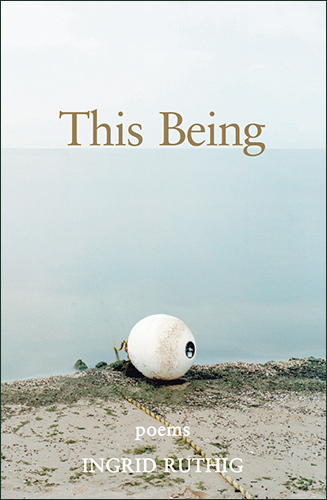
This Being
poems
Author Ingrid Ruthig ISBN 9781554554027 Binding Trade Paper Publisher Fitzhenry & Whiteside Publication Date March 28, 2016 Size 140 x 216 mmWinner of the League of Canadian Poets' 2017 Gerald Lampert Memorial Award for the best first book of poetry published by a Canadian.
In this, her debut collection, Ingrid Ruthig records the ebb and flow of individual life through time, landscape, and our collective existence. How we connect with the past, where we are now, and despite our inherent separateness, our personal convergences — these are what lay ahead on this journey. Ruthig also explores our need to create, to build a deeper sense of self, of belonging: questioning, observing, then striving to respond. Her voice is confident, concentrated, wry. This is a book of poems about the dynamic of being, and our shifting perception of who we are from one moment to the next.
Ingrid Ruthig
Earned a Bachelor of Architecture at the University of Toronto in the 1980s and practised the profession for more than a decade. Her work as a writer, editor and artist has appeared widely, with poems published in The Best Canadian Poetry in English, The Malahat Review, Descant, and many other journals and anthologies across Canada and abroad. She is the author of the poem sequence & artist's book Slipstream, the chapbook Synesthete II, and editor of The Essential Anne Wilkinson and Richard Outram: Essays on His Works, as well as a forthcoming volume on the work of David Helwig. She is a Hawthornden Fellow, and currently lives near Toronto.
Winner of the League of Canadian Poets' 2017 Gerald Lampert Memorial Award for the best first book of poetry published by a Canadian.
From the jury:
"Formally elegant, Ruthig's poetry is smooth and reflects an impeccable ear. Ruthig picks up an idea and unspools it to its end with precision and calmness. This is a book that took its time to be made and for its performance, being consistently excellent from front to back. Her poems read as sonic and 'sombre supplicant to the whims/ of living, age, genetics, and weather' fashioned into a 'stronghold of I.'"
On CBC's Ultimate Canadian Poetry List: 68 poetry collections recommended by you
"Ingrid Ruthig, whom novelist Douglas Glover has described as a 'recovering architect,' paints vivid scenes with words. . . Present within This Being are Ontario and the north, freezing winds and fertile soils, deep roots of tradition and looming winds of change. If there is architecture here, it manifests as the edifice of a Canadian soul, built of words that are both monumental and humble. For a nonCanadian like me, the poems embody the emotional structure of what it means to belong north of the 49th parallel."
— Canadian Architect magazine
"As intently as Ruthig observes, it's perhaps her listening—to sounds and silences alike—that inspires some of her poems' finest touches. Auditory tags are scattered throughout the book: a "pin-drop" autumn morning; the "low growl" of children in sleep; the "ragged pulse" of an old fridge; the "bite-snap" of an apple. In "Your Heart Like a House," a love poem, the poet listens anxiously to her husband's ailing heart as he sleeps. "My ear has trained for years now / on the hum of your cardiac vump / and it's clear the tune's all wrong."
"The second section of This Being contains many stellar, individual poems, including the 2005 Petra Kenney Poetry Competition winner, "Lily." Yet, to this reader, it does not feel as cohesive as the first. Still, it is notable for the poems inspired by Van Gogh, a touching homage in memory of the poet Richard Outram, and "Place de Rennes," after a photograph of an 1889 Paris train accident in which the only fatality was a news vendor's wife. Related in the voice of the victim, its final lines are a masterful example of dramatic understatement.
"The book circles back in its somber last third to themes previously touched upon: time's irrevocable passing, children growing and inevitably leaving, our bodies' fragility, but we're left with something like optimism anyway. "What You Find" is a litany of quotidian moments that gel and dissolve "as they all do." "And like a flare of necessary sun through the window panes, / it leaves you dazed and blinking away the blind spots." Like the anniversary couple in the closing poem, "October Ganaraska," watching spawning salmon ("broken soldiers homing in"), we take heart: "We just go on.""
— Arc Poetry Magazine
"To use words from Doorway, one of the most enigmatic of Ruthig's poems, her subjects frequently involve the "were" inside the "are, or the thin/now of between". Her architectural training and practice may coincide with the clarity, concision and visual richness of her poems, but the poems are also invested with metaphysical and emotional ambiguities. She has a baroque sense of fluidity, transience and riddling premonition. She is fascinated by the askew, the slant, the unknown country which is a continuously receding destination. Ruthig's is a poetry of very high ability and intelligence."
— Peter Sanger, author of Aiken Drum and poetry editor of The Antigonish Review
"Ingrid Ruthig's poems make possible, as the American poet James Dickey would have it, "the deepest kind of personal possession of the world." On offer are long views, in which "not glancing behind us... We just go on," as well as intimate observations of ordinary life; noting that skin is an organ that "shifts across sleep's dunes," or that a childhood caper with siblings is forever bound to "shared corners of sight." Accomplished in both energetic and elegiac tonalities, Ruthig's melodious lines and enjambments offer visually-rich detail and faith in living, despite the "headstrong, outbound current." While they recuperate and celebrate nature and attachments, these poems manage a philosophical eye that is a rare delight in a début collection."
— Nyla Matuk, author of Sumptuary Laws
Click here to see the poem Ten Mile Point.